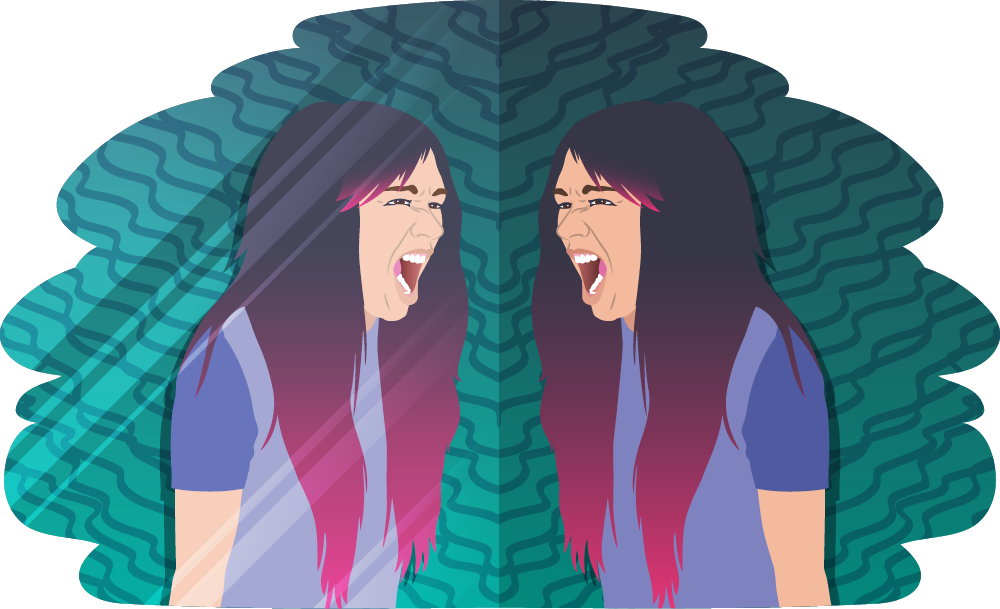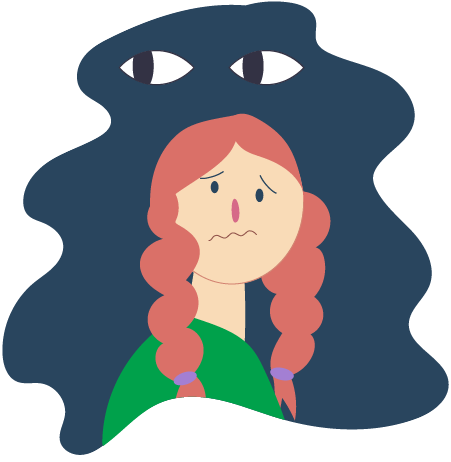All about dissociative disorders
Let’s look at what dissociation is, and explore the different types ...
READ MEBPD is a mental health disorder that affects people’s thoughts, emotions and behaviours. BPD can cause distress and sometimes be hard to cope with.
Content Warning: this article contains information about mental health which may be distressing or triggering.


Attachment: Attachment describes our bond/connection with important people in our life. Attachment starts at birth, with how we bond with our parents/carers and other immediate family members (e.g., brothers and sisters). As we get older, other people in our lives become important, like friends, significant others, etc. Unfortunately, not all our relationships are safe, secure and healthy. Relationships that are tricky, unpredictable, changeable, stormy or where your needs for love, care, affection and support aren’t being met, can make our attachment ‘anxious’ or ‘insecure’. And this can result in BPD emotions, thoughts and behaviours.
Trauma: There’s a link between trauma and BPD – especially in family violence, or family neglect. BPD can be an understandable ‘survival response’ to abuse. Some people argue that BPD isn't a legit diagnosis because it makes distressed people the ‘problem’ (victim-blaming). Many people have suggested that the name is also a problem – they say it’s more of a trauma disorder than a personality disorder.
Other things: Intense stress, a nasty break up or relationships breakdown, and other factors can play a role in BPD.

In the past, BPD has been misunderstood and stigmatised (sadly, even by some mental health professionals!) In some cases, this has led to discrimination, victim-blaming, and feelings of shame for people who have BPD.
Myth:
BPD is rare.
Fact:
BPD is not rare. Between 1-6% of people have BPD. BPD can affect people of all ages and genders.

Myth:
People with BPD use suicide and self-harm as a form of attention-seeking.
Fact:
People with BPD are NOT ‘attention-seeking’. They experience genuine distress and deserve support and compassion.

Myth:
BPD is impossible to treat.
Fact:
BPD is very treatable. There are lots of treatments (e.g., ‘DBT’) and options. Different things work for different people.
Have you ever wondered why people feel suicidal? Suicidal thoughts can be a way our brain copes when it’s overwhelmed by too much stress or trauma. To ‘protect’ us from further emotional harm, suicide can seem like an option/way out (to stop the hurting).
Self-harm, on the other hand, is often a coping strategy that helps people feel calmer (temporarily) when they’re distressed.
One of the tricky things is that suicide and self-harm can often get a lot of attention from mental health professionals (understandably, because of safety concerns and risk). It’s important for anyone who is experiencing recurring or ongoing suicidal thoughts and/or self-harm to also have support to focus and work on the deeper thoughts and feelings they have. These are often the ‘core issues’ behind suicide and self-harm – and addressing those together with people who care and support you can help reduce, improve - or even stop suicidal thoughts and self-harm.
If you have BPD (or care about someone with BPD) with self-harm or suicidal thoughts, these things are very treatable – and can even go away with time and support.
Reduce stress. General life stress can increase anxiety and distress. Doing things you enjoy can help reduce stress. Some real-life examples from people with BPD: listening to music, fidget toys, writing things down, and grounding techniques were the most helpful.
Professional support and treatment options. Professional supports (such as psychologists and psychiatrists) can help create a specialised treatment plan that might include things like medication, or Dialectical Behaviour Therapy (DBT), based on your needs, strengths and preferences.
Learn to ‘sit with’ uncomfortable emotions. Ok, to be fair, this one can suck a bit at first – but with time and a bit of practise, it can make a big difference. ‘Cognitive defusion’ is a strategy where we 1. ‘catch’ ourselves when we go down the path of thinking unhelpful thoughts, 2, ‘break’ the pattern (so we don’t get stuck in a stress loop), and 3. put some ‘distance/separation’ between us and our thoughts (e.g., remind ourselves not all thoughts are ‘real’).


Control impulsivity. Impulsive behaviours are often used as a coping strategy because they make you feel good, fast – but there can often be unwanted consequences for them – like self-sabotage. Finding other coping strategies, that allow you to ‘pause’ before acting can help. Delaying or distracting are two simple ways you can start doing this.
Be aware of assumptions and projections. Something we all do from time to time is create ‘stories’ (assumptions) about what others are thinking, based on incomplete info on their behaviour. This serves a purpose – it allows us to think quickly and make snap judgements without needing lots of detailed information. The problem is, we can sometimes make the wrong judgement or ‘project’ our feelings onto others, which can hurt our relationships. Being able to recognise when you’re doing this can be really empowering (and takes a bit of practise).
Someone I care about has BPD – how do I support them?
People with BPD told us, in their own words, how you can best support them.
“I often need reassurance that you’re not abandoning me.”
“I wish people knew we can’t control it and stopped telling us to not be so dramatic.”
“Just talk to me and listen.”
“Just because our emotions may fluctuate a lot, it doesn’t mean we’re not still struggling.”
“Treat us as equals.”
“Take time to research the disorder, common symptoms and learn to comfort.”
“Know my triggers.”
“We are loving & caring – we don’t always mean what we say or how we act, and we can do anything anyone else can do if not better sometimes!”
All about dissociative disorders
Let’s look at what dissociation is, and explore the different types ...
READ MEHearing voices
What’s happening to me? Worried about why you’re hearing voices ...
READ MEAll about schizophrenia
Let’s look at what schizophrenia is, and how to cope and ...
READ MEDealing with trauma
Let’s explore some different kinds of traumas and how people can ...
READ METalking helps! We’re here for you.
No problem is too big or too small.
We're here 24 hours a day, 7 days a week